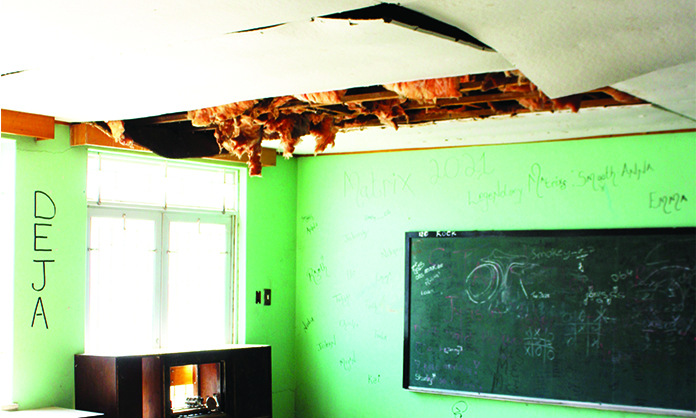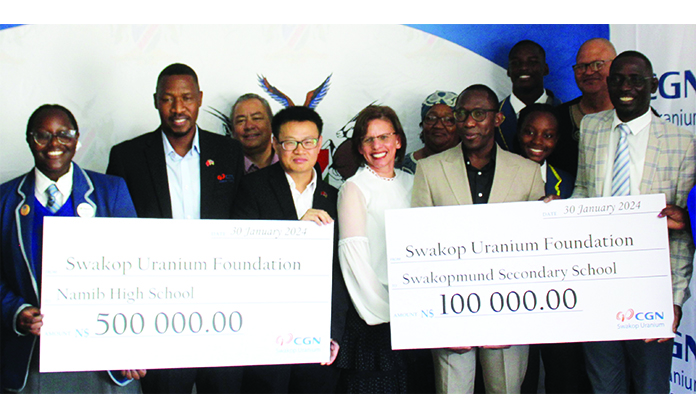School and hostel infrastructure in the Erongo region, particularly at the coast, are in disrepair due to erosive weather and a lack of funds, urging the private sector’s intervention.
In an effort to improve educational facilities in the region, Swakop Uranium Foundation’s ‘Invest in Education’ campaign donated N$600 000 to two schools at Swakopmund yesterday.
Of these funds, N$500 000 will be allocated for the renovation of the Namib High School (NHS) girls’ hostel, and N$100 000 for the renovation of Swakopmund Secondary School’s (SSS) computer labs.
Foundation chairman Percy McCallum expressed the company’s dedication to the educational needs of Namibian children, emphasising the foundation’s focus on aiding needy and impoverished communities, especially in education and technology.
“This is a clarion call to action to ensure no Namibian child is left behind as the world advances in education and technology,” McCallum said.
He urged other corporations, particularly in the Erongo region, to join in supporting educational initiatives.
The ‘Invest in Education’ campaign is a part of the foundation’s broader commitment to education and childhood development across the country’s 14 regions.
NHS principal Rosemarie September said communal efforts are needed to nurture the youth.
“We came to the realisation that to successfully invest in the young lives entrusted to us and to develop our nation, we need a variety of stakeholders,” she said.
Delving into the history of NHS, which celebrated its 110th anniversary last year, September highlighted the later addition of hostels.

When the school became a German school, Deutsche Schule Swakopmund, for grades 1 to 9, pupils, the House Romi Hostel was built in 1976 to accommodate pupils from outside Swakopmund. In 1981, NHS became a secondary school, leading to further expansion, including a boys’ hostel.
With the hostels nearing their 48th and 43rd anniversaries, respectively, the need for urgent upgrades is paramount, she said.
September told Erongo governor Neville Andre that renovating both hostels will require “many millions”, but that the N$500 000 from Swakop Uranium was a generous start.
The hostels’ roofs are leaking and ceiling boards are falling out. Tiles are coming off and the plumbing systems are dilapidated. In fact, the girl’s hostel had to be closed to about 100 boarders two years ago due to its unsafe condition.
Some of the girls had to be accommodated at the SSS hostel, while others were told to live at home.
This is the second Swakopmund school hostel closed for safety reasons after the Namib Primary hostel was also closed a few years ago and remains closed, due to no commitment to restore it.
“SSS was built 48 years ago,” said school principal Sinvula Sibanga, highlighting the challenges of maintaining a building in a coastal area for such an extended period.
“The possibility of maintenance is a problem and this is what we are going through on a daily basis.”
He highlighted the current state of the school’s infrastructure, particularly the dilapidated condition of the laboratories.
“It’s life-threatening,” he said, pointing out the dangers posed by the outdated and deteriorating facilities.
“The roof is having a serious leakage over the years now. I think if we give it this year, definitely that ceiling will start falling down.”
Sibanga said the funds would be utilised efficiently to enhance the quality of teaching and learning.
He acknowledged the symbiotic relationship between the school and Swakop Uranium, noting that many former pupils are now part of the company’s workforce at its Husab Mine.
He called on other stakeholders in education to assist schools, emphasising that government resources alone are insufficient to maintain school infrastructure.
“They cannot maintain their school infrastructure, which is really, really falling apart.”
Erongo education director Erenfriede Stephanus said the regional office is faced with financial challenges, with funds received from the education ministry primarily aimed at classroom needs.
“In the past few years, using the Covid fund, we managed to renovate about three hostels at Omaruru, Swakopmund and Okombahe. However, these renovations were not comprehensive, as the funds were also diverted to address the issue of overcrowded classrooms.”
Stephanus elaborated on the challenges faced during the renovations, citing a particular instance at the NHS’s girls hostel.
“During the rainy season two years ago, the hostel suffered significant damage. We were compelled to make arrangements with SSS for alternative accommodation to house our pupils, highlighting our urgent need for funds to fully refurbish these hostels,” she said.
In response to this crisis, the regional office called on private companies for assistance, with Stephanus praising Andre for his role in getting the private sector on board.
“Our hostels and school buildings, particularly in coastal towns, are in desperate need of attention due to weather conditions. This support is crucial for the overall improvement of our educational infrastructure,” Stephanus said.
Andre expressed profound gratitude to Swakop Uranium.
“We are not only saying thank you to Swakop Uranium, but we are celebrating the good teamwork and the hope it brings amid our challenges. This donation is a testament to our collective commitment to education and community development.”
He stressed the significance of infrastructure in education, noting its impact on the quality of education and the need for conducive learning environments.
“The renovation of the school hostels and the computer lab will undoubtedly enhance the living and learning conditions of our pupils, fostering an environment conducive to learning and personal growth.”
Andre also called on the schools to leverage this opportunity to improve their performance, emphasising the region’s mission to reclaim its position as the top performing region in Namibia.
Stay informed with The Namibian – your source for credible journalism. Get in-depth reporting and opinions for
only N$85 a month. Invest in journalism, invest in democracy –
Subscribe Now!






